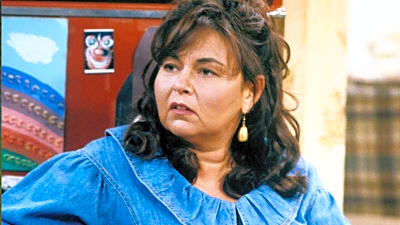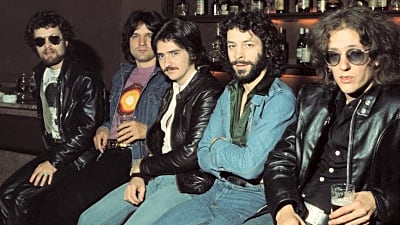- Home
- Quizzes
- My Quiz Activity
- Newsletters
- MY FAVORITES
- Add Sports/Teams
- SPORTS
-
NFL
- NFL Home
- Arizona Cardinals
- Atlanta Falcons
- Baltimore Ravens
- Buffalo Bills
- Carolina Panthers
- Chicago Bears
- Cincinnati Bengals
- Cleveland Browns
- Dallas Cowboys
- Denver Broncos
- Detroit Lions
- Green Bay Packers
- Houston Texans
- Indianapolis Colts
- Jacksonville Jaguars
- Kansas City Chiefs
- Las Vegas Raiders
- Los Angeles Chargers
- Los Angeles Rams
- Miami Dolphins
- Minnesota Vikings
- New England Patriots
- New Orleans Saints
- New York Jets
- New York Giants
- Philadelphia Eagles
- Pittsburgh Steelers
- San Francisco 49ers
- Seattle Seahawks
- Tampa Bay Buccaneers
- Tennessee Titans
- Washington Commanders
-
MLB
- MLB Home
- Athletics
- Arizona Diamondbacks
- Atlanta Braves
- Baltimore Orioles
- Boston Red Sox
- Chicago White Sox
- Chicago Cubs
- Cincinnati Reds
- Cleveland Guardians
- Colorado Rockies
- Detroit Tigers
- Houston Astros
- Kansas City Royals
- Los Angeles Angels
- Los Angeles Dodgers
- Miami Marlins
- Milwaukee Brewers
- Minnesota Twins
- New York Yankees
- New York Mets
- Philadelphia Phillies
- Pittsburgh Pirates
- San Diego Padres
- San Francisco Giants
- Seattle Mariners
- St. Louis Cardinals
- Tampa Bay Rays
- Texas Rangers
- Toronto Blue Jays
- Washington Nationals
-
NBA
- NBA Home
- Atlanta Hawks
- Boston Celtics
- Brooklyn Nets
- Charlotte Hornets
- Chicago Bulls
- Cleveland Cavaliers
- Dallas Mavericks
- Denver Nuggets
- Detroit Pistons
- Golden State Warriors
- Houston Rockets
- Indiana Pacers
- Los Angeles Clippers
- Los Angeles Lakers
- Memphis Grizzlies
- Miami Heat
- Milwaukee Bucks
- Minnesota Timberwolves
- New Orleans Pelicans
- New York Knicks
- Oklahoma City Thunder
- Orlando Magic
- Philadelphia 76ers
- Phoenix Suns
- Portland Trail Blazers
- Sacramento Kings
- San Antonio Spurs
- Toronto Raptors
- Utah Jazz
- Washington Wizards
-
NHL
- NHL Home
- Anaheim Ducks
- Boston Bruins
- Buffalo Sabres
- Calgary Flames
- Carolina Hurricanes
- Chicago Blackhawks
- Colorado Avalanche
- Columbus Blue Jackets
- Dallas Stars
- Detroit Red Wings
- Edmonton Oilers
- Florida Panthers
- Los Angeles Kings
- Minnesota Wild
- Montreal Canadiens
- Nashville Predators
- New Jersey Devils
- New York Islanders
- New York Rangers
- Ottawa Senators
- Philadelphia Flyers
- Pittsburgh Penguins
- San Jose Sharks
- Seattle Kraken
- St. Louis Blues
- Tampa Bay Lightning
- Toronto Maple Leafs
- Utah Mammoth
- Vancouver Canucks
- Vegas Golden Knights
- Washington Capitals
- Winnipeg Jets
- NCAAF
- NCAAM
- Olympics
- Boxing
- Entertainment
- Lifestyle
- Golf
- MMA
- Soccer
- Tennis
- Wrestling
- Sports Betting
- More Sports
- RESOURCES
- My Account
- YB on Facebook
- YB on Twitter
- YB on Flipboard
- Contact Us
- Privacy Policy
- Terms of Service

25 times musicians switched up the formula with their act
No artist wants to make the same album twice. New records should build upon previous successes, perhaps deviating from an established formula, or experimenting with something fresh and new. Acts like Beck, Taylor Swift, Erykah Badu, Björk, and Kendrick Lamar have thrilled their audiences by switching things up between records, but sometimes their success feels like the exception to the rule. Several acts pivoted from successful bands to oddball solo experiments or tried out new genres in trying to score a blatant radio hit. We're not looking for subtlety here: we are looking for some of the most surprising, violent, and downright puzzling hairpin genre turns we've ever seen.
Howlin' Wolf is Forced to Go Psych-Rock with 1969's "The Howlin' Wolf Album"
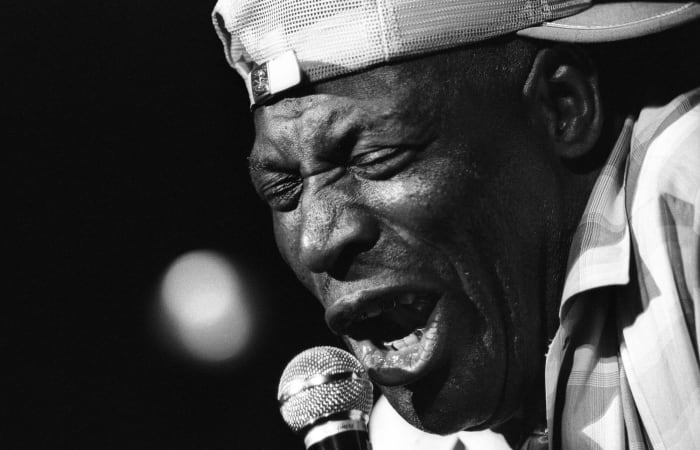
What business does Howlin' Wolf, Mr. "Smokestack Lightning" himself, have to do with '60s psych-rock? In fact, he didn't want to mess with that genre, which is why he wasn't too keen when Chess Records, having found success with their Cadet Concept subsidiary and the psychedelic band Rotary Connection, decided that they could revive the commercial prospects of legacy acts like Howlin' and Muddy Waters by updating their classic Blues sound for the modern era. Muddy Waters' "Electric Mud" was a surprise success, but even he didn't think of it as a Blues album proper. Howlin' Wolf was even less enthused, frequently quarreling with the label over this insisted direction. It got so brutal, the cover of this album was simply text: "This is Howlin' Wolf's New Album. He Doesn't Like It. He Didn't Like His First Electric Guitar Either." Shockingly, declaring to the record-buying public that your artist doesn't even like their new album is not the way to garner sales. Wolf's experiment was never repeated.
Frank Sinatra Does a Rock Opera with 1970's "Watertown"

Ol' Blue Eyes isn't afraid of a concept album. In fact, he's released several of them, many of which are considered his best works (see: 1955's "In the Wee Small Hours"). Yet Sinatra managed to resist the call of blatant pop-rock for decades, which is why "Watertown", his album-length narrative featuring story-songs co-penned by The Four Seasons' Bob Gaudio, is such a curiosity. There isn't a hit to be found on these barely mid-tempo tracks with interlacing narrative strands, but behind the scenes, this was the first time that Sinatra recorded his vocals over a pre-recorded orchestra instead of being live on the floor with them. Much like bad green screen in a modern movie, this small difference was noticeable in Sinatra's wavering performance. None of it really made sense to the public either, and it was Sinatra's first album to miss the top 100 rankings of the Billboard Albums chart. Some have gone back and given the album a positive critical re-assessment, but it's of no surprise that Frankie never tried something like this again.
Ringo Starr Goes Country with 1970's "Beaucoups of Blues"

The Beatles were no strangers to country music, but as the group was dissolving, their solo releases went experimental, weird, and wild. When the ever-lovable Ringo Starr dropped the first album under his own name in 1970, "Sentimental Journey", he was praised for his embrace of pre-rock song covers and style. Yet later that year, he also dropped "Beaucoups of Blues", a true-blue country-and-western record full of sawing fiddles, acoustic strums, and backing cowboy choirs. It was a run-of-the-mill record for its type but distinct and unusual for the lineage of Fab Four solo LPs. During the sessions, a Starr-penned original, the goofy "Coochy Coochy", was released as a B-side, but the album was by and large ignored by the public. Starr didn't return to solo records until three years later after he dropped the more conventionally-pop "Ringo", which contained his signature solo hits "Photograph" and "You're Sixteen".
James Brown Drops the Vocals for an Instrumental Psych Record Called "Sho Is Funky Down Here" in 1971

A talented multi-instrumentalist and bandleader, James Brown was known for his showman personality and lively music, so it might come as a surprise to some that he'd put out albums full of instrumental music before. Yet records like 1966's "Mighty Instrumentals" featured wordless takes on known entities like "Papa's Got a Brand New Bag" and "Choo-Choo (Locomotion)". In 1971's "Sho Is Funky Down Here", he tried something different, as the Hardest Working Man in Show Business wanted to get down with psychedelic rock. While that is Brown playing the organ throughout, this whole affair is a strange experiment, as Kenny Poole's effect-heavy guitar keeps a-noodlin' through most of the record's run time with little change in texture. The album is serviceable but unremarkable, a curious one-off if anything else, but Brown's fans weren't along for the ride, which is in part why, later in the year, he pivoted sharply back to funk with new full-length "Hot Pants".
Lou Reed Unleashes Waves of Distorted Feedback with 1975's "Metal Machine Music"
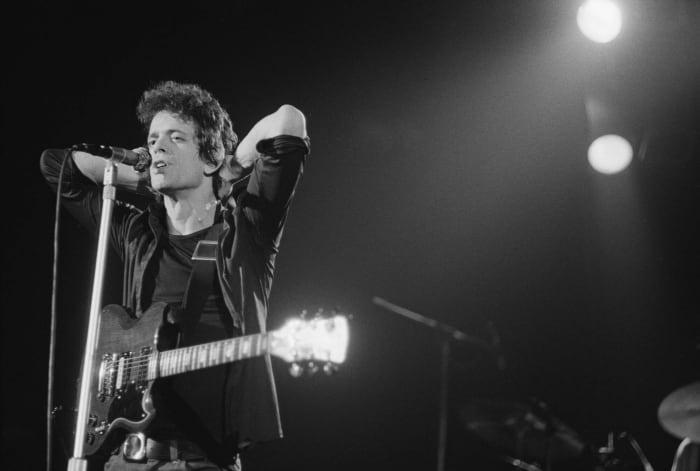
Proudly declared as "the most returned album of all time," this all comes down to presentation. While Lou Reed made some daring and abrasive music during his time with the legendary band The Velvet Underground, he had branched out into more radio-friendly territory with 1972's David Bowie-produced solo fare "Transformer", lead by hits like "Walk on the Wild Side" and "Satellite of Love." Yet in 1975, his new record "Metal Machine Music" bolstered a cover of Reed in his dark aviator sunglasses, black leather jacket, and a stern glance that said it was time to rock. The album itself ... was noise. Pure layers of guitar amplifier feedback looped over itself to create four vinyl sides of sonic chaos. It didn't chart, was largely dismissed, and was made while Reed was intoxicated. Yet, like the way these things sometimes go, the album was later reassessed as an industrial noise classic, pushing genre boundaries while ignoring profit-driven record label motives. After pulling moves like this, few were surprised by his 2007 turn towards ambient/new age music with his "Hudson River Wind Meditations" record.
Neil Young Goes Electro with 1982's "Trans"
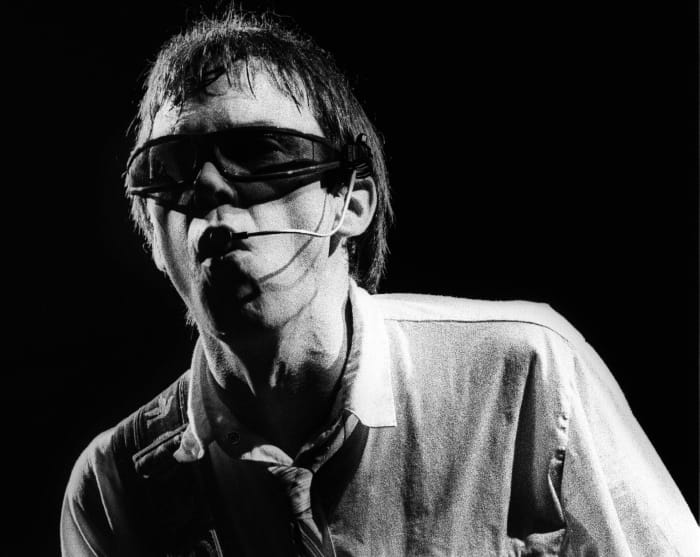
"Little Thing Called Love", which opens Neil Young's infamous 1982 record "Trans", doesn't sound too radical. It's a jaunty little number that trades in the rambling folk-rock that had become his forte, so it's easy to see why Geffen felt the need to sign Young to a lucrative contract that guaranteed him almost $1 million per album. Yet the second that "Computer Age" kicks in, with its digital drum beats, cheap synth sounds, and arguably too much vocoder, it's clear we're in uncharted waters. It took everyone by surprise, and despite a few other "non-electronic" songs sprinkled in the track list, this record felt like a massive expenditure of Young's artistic goodwill. Allegedly, the digital effects were all designed as a way to try and communicate with his son who had been diagnosed with cerebral palsy, which is very inspiring but still made for a stiff and stilted album. Geffen Records was happy to indulge in this experiment so long as Young returned to the hits, but Young had another surprise in store for his new bosses...
Neil Young Goes Rockabilly with 1983's "Everybody's Rockin'"
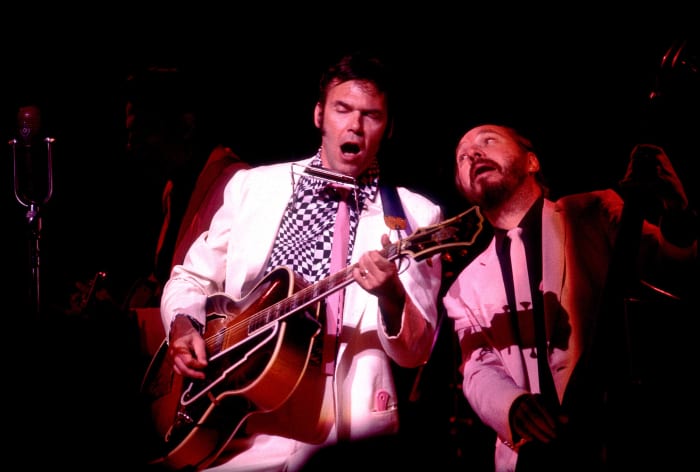
Following Young's commercially disastrous flirtation with electronic music, he promised Geffen Records a full-bore country album, but, so incensed over the "Trans" debacle, they demanded a rock album instead. Young smirked and gave Geffen a rock album alright -- a throwback rockabilly LP called "Everybody's Rockin'" attributed to Neil Young & the Shocking Pinks. Clocking in at less than 25 minutes, this second jerk in a radical new direction alienated Young's fanbase even further, and Young ended up trying to tour this album to disastrous turnout. There were a few Young originals mixed in with a bunch of early Sun Records-era covers, but the album was only unique because it was Young performing so out of character. As such, Geffen eventually sued Neil Young for making music "unrepresentative" of himself.
Joni Mitchell Experiments with '80s Synth Pop on 1985's "Dog Eat Dog"

Listening to "Dog Eat Dog" almost feels like you're being pranked. Yes, that's Joni Mitchell's voice, but, having released right in the middle of the digital '80s, it reeks of dated sheen, with echoing drums, swaths of keyboards, and endless cheap electric guitar noodles darting around the mix. Yes, that's Michael McDonald singing on opener "Good Friends", and no, this isn't her guitar playing. Joni was behind the synths this time, and the result was one of the largest artistic and commercial misfires of her career. What's most frustrating about this record is that as easy as it is to write it off as Joni getting lost in the sound of the era, there are real moments of brilliance, like on the experimental number "Smokin' (Empty, Try Another)". Her fans still wonder why she bothered to try and sound like 'Til Tuesday when she already sounds like Joni Mitchell?
Liza Minnelli Goes Straight to the Dance Clubs with 1989's "Results"

Watching star of stage and screen Liza Minnelli collaborate with one of London's chief manufacturers of '80s synthpop anthems, Pet Shop Boys, likely excited fans of both artists, just as how outsiders viewed the pairing as unexpected. Yet somehow, the whole thing actually worked, as Minnelli's voice never sounded out of place in her strobe light surroundings. Despite the record being only a minor hit in the U.K., its legacy has endured, and releasing a dancey new wave version of "Losing My Mind" from Stephen Sondheim's "Follies" as a lead single certainly made for a bold statement. As fun as it was, Minnelli didn't ever return to this sound, as her next solo full-length, 1996's "Gently", went back to the jazz vocal standards that were her signature.
Dee Dee Ramone Drops the Punk Guitars for 1989's Hip-Hop Curiosity "Standing in the Spotlight"
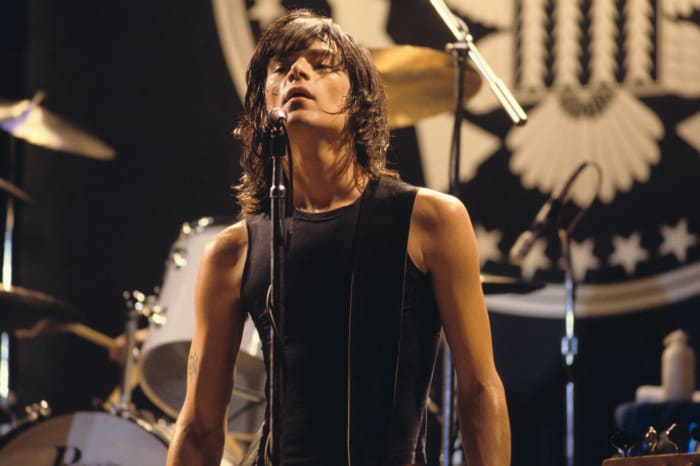
In one of the most curious pivots in rock history, the Ramones' founding member and bassist Dee Dee Ramone released a rap album under the moniker Dee Dee King, and it's about as good as you think it is. While billed as a rap album, "Standing in the Spotlight" still has quite a few bland rock numbers to it, but in the opening track "Mashed Potato Time", Dee Dee's very halting and (let's say) unique style of rapping truly must be heard to be believed. Penned as a way to settle his thoughts on his journey to sobriety, the record is, at times, comically bad, but also pure in its intent. You can't find it on any streaming services, and it didn't do particularly well on the charts -- even with a guest spot from friend Debbie Harry -- but perhaps Dee Dee King was meant to be a one-album wonder all along. In fact, after hearing that album, it's how we prefer it.
Scott Walker Went from Orchestral Pop to Avant-Garde Industrial with 1995's "Tilt"
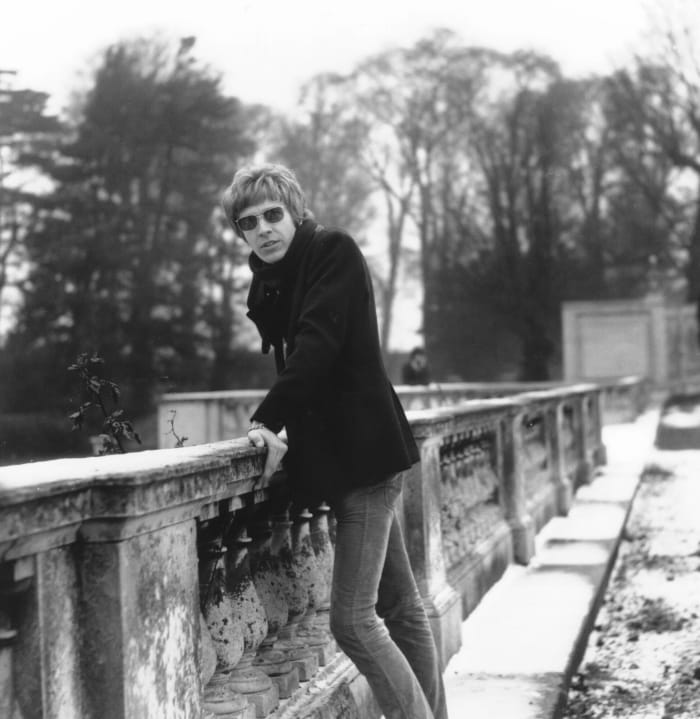
When Scott Walker debuted with his orchestral-pop vocal outfit The Walker Brothers, they had hits. When Scott Walker went solo, he scored a couple of hits in the U.K. but largely went down as a cult artist. With his rich baritone and love of dramatic songwriters like Jacques Brel, Walker very much wrote his way into history as an act with niche appeal, but as time went on, his first four solo records have become lionized as truly boundary-breaking art-pop. Yet after years of putting out records that that failed to chart and were all but ignored by critics, Walker re-emerged in 1995 with "Tilt", and absolutely no one could have predicted what they were going to hear. Submerging himself in the burgeoning post-rock scene, Walker delivered a menacing, experimental, and brooding album that placed his soulful voice in a haunting new context. "Tilt" simmered with unease, with ice-cold orchestras mixing with sudden bursts of percussion that absolutely unnerved. It was a striking move, and the rest of Walker's career found him only diving further into sounds that were dark and compelling. For the record, yes, the end of "The Escape" absolutely sounds like the world's most dramatic Gollum impersonation and it must be heard to be believed.
Vanilla Ice Drops Pop-Rap in Favor of Nu-Metal on 1998's "Hard to Swallow"

It's pretty wild for your debut album to sell seven million copies before all of your commercial prospects disappear, but not everyone can have a career like Vanilla Ice. Despite "Ice Ice Baby" becoming a generational hit, there is only so much room you can go after crafting what is effectively a novelty single. Quickly placed into his own terrible leading man role in the film "Cool As Ice" and delivering the "Ninja Rap" to the sequel to the "Teenage Mutant Ninja Turtles" movie, Vanilla Ice's schtick waned quickly, which is why the proper follow-up to his debut album, "Mind Blowin'", failed to chart at all. Realizing he wasn't being taken seriously anywhere, Ice pivoted to nu-metal on 1998's "Hard to Swallow", which tried its hardest to ape the sounds of bands like Godsmack and Staind. Dressing up "Ice Ice Baby" in hard rock clothes with the single "Too Cold" fooled nobody, and nowadays, Ice spends a lot of his time hanging out with the Insane Clown Posse and appearing in low-budget reality shows.
Garth Brooks Cosplays As a Rock God with 1999's "The Life of Chris Gaines"

Garth Brooks could do no wrong. As the singer and songwriter who supercharged country music in the commercial powerhouse that it is today, you too would be feeling invincible after all of your albums sold over 10 million copies and your arena tours were constant sell-outs. Wanting to break out of the country-pop mold he helped create, he decided to end the millennium by inventing a fictional rock-star persona in the form of Chris Gaines. Literally every detail about the creation of this record is better than the last, as this "pre-soundtrack" to a movie about the life of Chris Gaines was designed as a greatest hits album across Gaines' discography, where the liner notes posit that he would drop albums with no promotion and they'd still sell seven million copies (a delusion that could only come from Garth Brooks' experience). He even recorded his own VH1 "Behind the Music" special in character. After a so-bad-it's-good moment where Brooks hosted "Saturday Night Live" and had "Chris Gaines" as a musical guest, both his old fans and the public he was trying to court were confused by what was happening, leading to a record that did so poorly (by Garth Brooks standards) that it effectively killed his career. Yet the worst part? Taken on its own, "The Life of Chris Gaines" is a pretty fun little pop-rock record -- but you know darn well Brooks has made it his mission to make sure it stays off of streaming services.
Radiohead Dropped Alt-Rock Guitars for IDM Synthpads for 2000's "Kid A"

When the English quintet Radiohead dropped the 1992 single "Creep", little did they know that it would become one of the defining rock songs of the '90s. However, a good song on an OK record wasn't good enough, which is why 1995's "The Bends" showed a quantum leap forward in their songwriting, and 1997's "OK Computer" was nothing short of an alt-rock masterpiece. Burned out by the pressures of fame and touring while playing the same rock songs over and over, the group felt in need of a break from their routine, and with 2000's "Kid A", they ended up rewriting the rulebook. Rock acts had long flirted with electronica, but Radiohead's switch to what was effectively an ambient-techno album was about as unexpected a turn as they come, from penning "OK Computer" to being OK with all the computers in the recording studio. Guitars showed up on occasion, but the cold, icy tone of the bleak digital soundscapes was perfectly in line with Radiohead's apathetic worldview, and this giant change in sound altered their trajectory forever.
Faith Hill Tries to Be Celine Dion with 2002's "Cry"
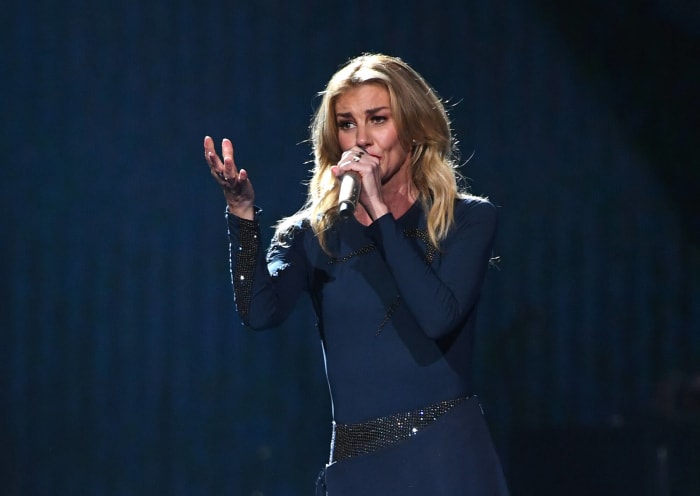
While Shania Twain blurred the line between country and pop from the comfort of stadium stages, Faith Hill was a bit more of a traditionalist Nash Vegas diva who was only getting more and more popular with each passing year. After crossing over with "This Kiss" in 1998, Hill became something close to a household name, something that was further propelled by her marriage to fellow superstar Tim McGraw. Yet after her Celine Dion-esque contribution to the "Pearl Harbor" soundtrack didn't put up Celine Dion-sized numbers, Hill doubled down on becoming a modern adult contemporary artist with 2002's "Cry". While not as radical a change in sound as some of the other acts on this list, you wouldn't know it from country radio programmers at the time, some of whom rejected what they thought was her selling out to pure pop music while promising to never play her singles again. While Hill still had hits after "Cry", her building momentum started slowing down tremendously and tracks like the "Cry" opener "Free", full of what could effectively be charitably described as "attempted funk," certainly damaged her reputation in Nashville.
Jewel Goes Unironic Dance Diva with 2003's "0304"

Pivoting from a genre like country or folk to pop music has to be carefully handled, lest your audience think that you've abandoned them. Taylor Swift changed gradually over time, easing her fans into songs with more keyboards, beats, and less twang than what they were used to. Yet for Jewel, the singer-songwriter who struck big with her cathartic folk-pop debut "Pieces of You" in 1995, she decided to rip the bandaid off and go full Britney with 2003's "0304". While her albums since "Pieces of You" only sold a fraction of what her opening salvo did, the sharp pivot to Top 40 dance diva felt like it came out of nowhere. While lead single "Intuition" did hit the Billboard Top 20, many declared Jewel's turn to the clubs as nothing but a cash grab, even with the album's liner notes insisting that the album was "lyric-driven, like Cole Porter stuff." After "0304", this Jewel lost a lot of shine.
Prince Attempted New-Age Jazz-Funk with 2003's "N·E·W·S"
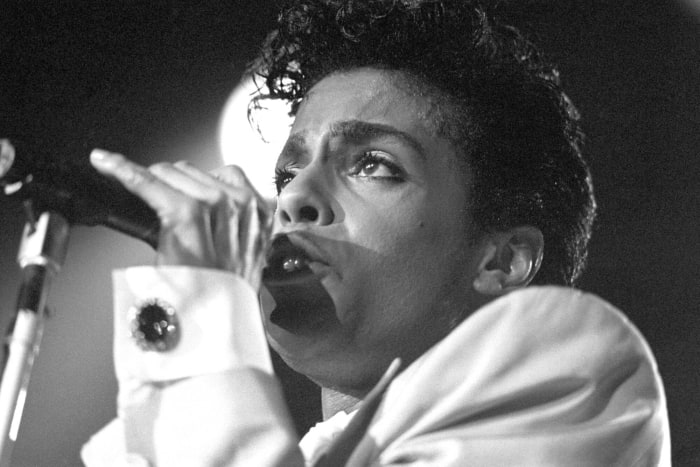
Prince always did it himself. Not just writing the songs, producing the songs, singing the songs, and playing every instrument (save for horns) on the songs. He also tried out every genre, from his reliable standbys of pop, rap, and funk to tepid experiments with hip-hop. 2003's "N·E·W·S" was a pivot towards smooth jazz fusion, with his long-time collaborator Eric Leeds on the saxophone. This record is four tracks long, with every track clocking in at 14 minutes even, and it's truly amazing how boring it is. With pop or even funk, Prince could record himself doing all the instruments and plan a groove, but with jazz, there's a degree of collective harmony and improvisation involved, which unfortunately cannot be done when you're the only major musician in the studio. "N·E·W·S" has the unfortunate distinction of being Prince's lowest-selling album, which is perhaps why he never revisited the genre in any significant way again.
Nelly Furtado Migrates from NPR Folk-Pop to Hip-Hop Bangers in 2006's "Loose"

When Nelly Furtado's debut, "Whoa, Nelly!", dropped in 2000, it felt like a breath of fresh air in the pop scene, as the worldbeat and bossa nova flavors of her radio-ready singles sounded like nothing else out there. "I'm Like a Bird" was her signature song, but none of the singles on her sophomore record "Folklore" put up great numbers. So imagine the shock on fans' faces when, in 2006, she dropped the flirty club-filler "Promiscuous" with the help of new producing partner Timbaland, himself hot off of the successes of Justin Timberlake's early solo hits. Suddenly, Nelly was topping the charts again, spitting some bars, and pivoting from dirty dance tracks ("Maneater") to soulful midtempo ballads ("Say It Right", another chart-topper in the U.S.). Some purists argued she sold out much like Jewel, but unlike Jewel, Nelly actually had the songs to back it up, and some newer Furtado fans may not even be aware that she put out singles prior. Unfortunately, Furtado took too long to strike again, dropping a Spanish-language record in 2009 and then finally returning to pop music proper in 2012, long after her heat had died down.
Jessica Simpson Pivots to Country with 2008's "Do You Know"

To be honest, Jessica Simpson always had an unusual pop star course. Launching in late 1999 after Christina Aguilera and Britney Spears had already gobbled up much of the pop star oxygen, Simpson landed hits both traditional (big pop ballad opening salvo "I Wanna Love You Forever"), unusual (the "Jack & Diane"-sampling "I Think I'm in Love With You"), and terrible (her much-derided "These Boots Are Made for Walkin'" cover for the "Dukes of Hazzard" soundtrack). After her 2006 pop comeback "A Public Affair" underperformed following all the tabloids swirling of her split from fellow pop star husband Nick Lachey, Simpson figured her "Boots" cover gave her some down South credibility, allowing her to spin directly into country charts. "Do You Know" was preceded by the powerfully horny single "Come On Over", which received modest support from country radio but failed to garner love from the Nash Vegas purists. Moving even fewer units than "A Public Affair", Simpson dropped one last Christmas album in 2010 before pivoting to reality television. She hasn't released much notable music since.
Chris Cornell Goes to the Dance Club with 2009's "Scream"

With his work in Soundgarden and Audioslave, it's no wonder Chris Cornell gets brought up a lot in the discussion of best all-time rock vocalists. When he dropped his first solo album in 1999, it achieved minor success, while his 2006 sophomore release was buoyed by "You Know My Name", his out-of-left-field James Bond theme. Yet in 2007, with little warning, he dropped "Scream", his album-length collaboration with rap and pop-producing kingpin Timbaland. Putting Cornell's signature growl under club lights was assuredly a choice, but Cornell's weak and often misogynistic songwriting felt out of place for him. Critically derided, the album did nothing to help either Cornell or Timbaland's good fortunes. Now, the album primarily exists as a curiosity to be featured in lists like this one.
Lil Wayne Turns into a False Rock God on 2010's "Rebirth"

You could hear Lil' Wayne dropping electric guitar solos into his rap hits slowly over time. The video for 2008's chart-topping "Lollipop" even had Wayne play his axe on top of a moving car. Yet when he dropped "Rebirth" at the top of 2010, people were confused by this hard pivot into full-bore rock. Lead single "Prom Queen" flirted with alternative/metal tropes, while his nigh-unintelligible pop-punk ode "Knockout" with Nicki Minaj remains one of his worst all-time singles. (No wonder the record's biggest hit, "Drop the World" featuring Eminem, was the song that sounded most like Wayne's established rap sound.) Fortunately for Wayne, he was in his imperial period where he could do no wrong and wisely spent his artistic capital at a time when he had plenty to spare. While rock elements came up in his music at times since "Rebirth", that record remains one of his all-time lowest-sellers, which makes it no wonder why he's largely stuck with rap music since then.
Lady Gaga Became a Modern Jazz Crooner with Tony Bennett's Blessing on 2014's "Cheek to Cheek"
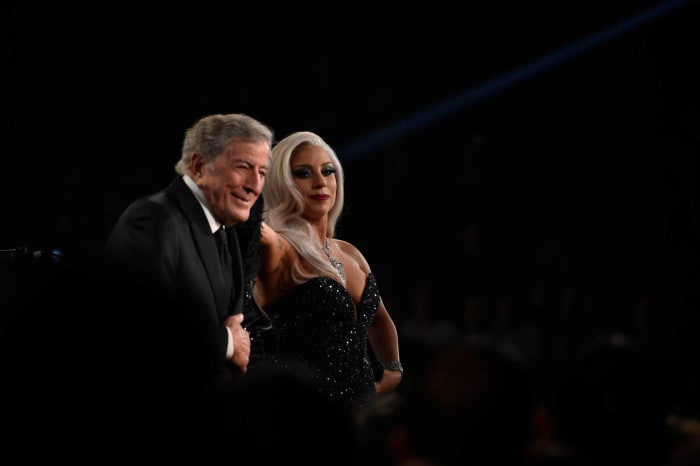
Following the mixed reception to Lady Gaga's campy and controversial 2013 record "Artpop", the pop diva decided to make the most unusual of pivots by putting out a record full of jazz standards recorded with Tony Bennett. While the two had been friends since she guested on one of his "Duets" records, she had been expressing interest in working with Bennett in a greater capacity, as she possessed more powerhouse vocal chops to pull off these numbers than most of her contemporaries. Thankfully for Gaga, she had already established herself as someone who isn't afraid of bold moves, so when "Cheek to Cheek" dropped, a large contingent of her fans followed her, and she ended up with yet another #1 album that would later go on to win a Grammy. The two dropped another set in 2021 ("Love for Sale") that didn't put up the same numbers, but Gaga proved that changing genre didn't mean losing your audience, so long as your pivot falls within your artistic flightpath.
Paul McCartney Dabbles with Musique Concrète on 2000's "London Sound Collage"

As the man who is considered one of the building blocks of all of pop music, Paul McCartney, of course, gets a musical permission slip to do what he wants. An orchestral jazz record covering his own solo record "Ram" under the guise of Percy Thrillington? Why not! Multiple classical records? Anything for Paul! A series of ambient-techno albums as The Fireman? It's one of the best secrets in his discography. Yet "Liverpool Sound Collage" is something else. Released in conjunction with his Fireman producing partner Youth and the Welsh psych-rock outfit Super Furry Animals, "London Sound Collage" featured chopped-up beats and dropped studio chatter that McCartney pulled from all over his library of songs, all done for the sake of a requested museum exhibition. It very much sounds like experimental electronic albums released around this time, but this one has the unusual association of crediting The Beatles on a few tracks, making it a standout in the discographies of everyone involved.
Machine Gun Kelly Stops Rapping to Try and Revive Pop-Punk with 2020's "Tickets to My Downfall"

Machine Gun Kelly didn't make much of an impression early on in his career, guesting on DMX and Little Mix songs to little fanfare. His Camila Cabello pop collaboration "Bad Things" was a hit, but it wasn't until his 2018 Eminem diss "Rap Devil" that he truly started garnering attention. He baited a response out of Eminem but couldn't carry that momentum into further successful singles, which is why in 2020, he pivoted to pop-punk revival with "Tickets to My Downfall". Very inspired by the likes of Blink-182 (which makes sense given Blink's drummer Travis Barker would soon become a frequent Kelly collaborator), the record was a genuine hit, spawning staples like "My Ex's Best Friend" featuring Blackbear. Due to the success, he stuck with the sound and acknowledged the accusations of swapping genres for dollars by calling his 2022 follow-up LP "Mainstream Sellout".
André 3000 Turned from Hip-Hop to Ambient Jazz-Flute with 2023's "New Blue Sun"

André 3000 technically put out a solo album already as part of OutKast's daring split-LP concept "Speakerboxxx/The Love Below" in 2003, but since then, he's primarily stuck with acting and dropping often-legendary guest verses on a spate of singles throughout the years. "The Love Below" was praised for its many unique artistic detours, like his acoustic ballad "Blow Off Your Cool" with Norah Jones, but that was only a preamble to what André had in store. In late 2023, he dropped "New Blue Sun", which went straight into new age/jazz territory. Working with some of the biggest names in the California ambient-instrumental scene (Carlos Niño, Surya Botofasina, Nate Mercereau), André garnered a lot of acclaim for staying true to himself despite pressures to drop another rap album. He even acknowledges this on the record's opening track, which eventually broke a record for the longest-titled song to ever hit the Billboard Hot 100: "I Swear, I Really Wanted to Make a 'Rap' Album but This Is Literally the Way the Wind Blew Me This Time".
Evan Sawdey is the Interviews Editor at PopMatters, and has written for the likes SPIN, Entertainment Weekly, and several other sites. He currently hosts the 'Worldwide Tea' International Drag Race podcast. He lives in Los Angeles with his wonderful husband and can be found on most socials @SawdEye.
More must-reads:
- 13 films that ruined the life of an actor
- Beloved celebrities who revived their careers against all odds
Customize Your Newsletter
 +
+
Get the latest news and rumors, customized to your favorite sports and teams. Emailed daily. Always free!
PRIVACY POLICY EDITORIAL POLICY CONTACT US
ABOUT YARDBARKER TERMS OF SERVICE
Use of this website (including any and all parts and
components) constitutes your acceptance of these
Terms of Service and Privacy Policy.
This site is for entertainment purposes only.
There is no gambling offered on this site.
Gambling Problem? Call 1-800-Gambler.

